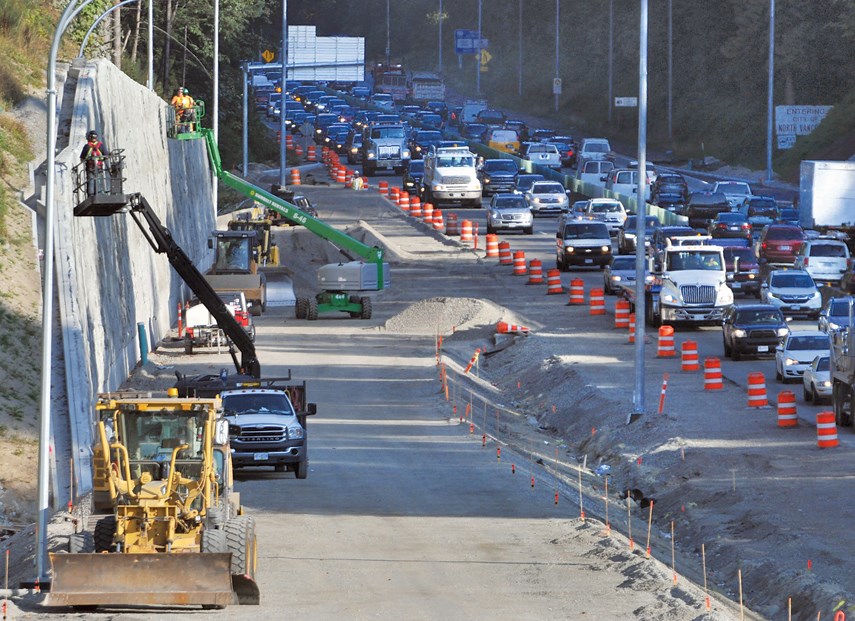After two years of heavy construction, the Ministry of Transportation and Infrastructure says there’s light at the end of the tunnel – or overpass – for the Mountain Highway interchange.
The first phase of the $200-million project to update the congested bridgehead infrastructure is now a year behind schedule, but project manager Jay Porter said the final pieces of the project are now coming into place.
At the root of the delay was a mass of underground infrastructure that had to be decommissioned, moved or upgraded while the ground was opened up, Porter said. That included work by Metro Vancouver for sewer and water lines at Keith Road and Brooksbank Avenue, as well as BC Hydro, FortisBC and Telus infrastructure.
“They were not part of the original scope of the project, but often we get approached by third-party utilities to include them as part of the project. It makes sense because we have the ground opened up, we have resources on hand. It’s cheaper to do it through the project and it’s also less impactful to the community,” he said.
The utility owners were notified during the design phase, but Porter said it takes time for them to come up with their own funding, Porter added.
Over the next two months, the first phase is expected to wrap, Porter said.
Crews reopened the Lynn Creek Trail over the weekend so it will be available to Lynnmour Elementary students. The ministry anticipates reopening the westbound “truck climbing” lane on the Cut sometime during the first week of September. By the middle of the month, Porter said the Mountain/Keith intersection will be completed “with the ultimate signal timing and pavement marking.”
“Now we just want to get the Keith Road eastbound traffic moving much better,” he said.
Unfortunately, Metro Vancouver will require the road to be opened up temporarily once more at the start of November, when water use is at its lowest, for final connections to be made.
“That’s going to be approximately two to three weeks of traffic impacts there but once that’s done, we’re out of there for good,” he said.
The Sallop Trail, with its new pedestrian tunnel under Mountain Highway and connection to the trails along Lynn Creek, should be open in October. Around the same time, commuters can expect to see the new eastbound off-ramp and westbound on-ramp on Highway 1 to be open, which should bring some relief to those suffering from construction fatigue, Porter said.
“I’m grateful for a lot of their patience and understanding, although I do understand the frustration. There is light at the end of the tunnel with Mountain Highway,” he said. “[It was] certainly a very challenging project and once we have that one complete, I believe there will be a lot less activity happening in and around that area. People will be able to get through and be able to utilize the benefits that Mountain Highway is going to provide.”
The latest traffic modelling the ministry has done projects the commute time from the top of the Cut to mid-span of the bridge to be half of what it is now.
For some though, the wait has been unbearable. Residents along East Eighth Street have documented dozens of cases of work being done outside times permitted by the noise bylaw, heavy equipment and contractors’ vehicles taking over their street, belligerent interactions with contractors and flaggers, and property damage.
“My quality of life has diminished significantly over the last two years. We’ve had health and safety concerns, bullying and intimidation tactics, blatant disregard for the safety of the residents. And we feel that this project team has just decided Eighth Street is the price to pay to meet their schedule. They’ve been working around the clock for three weeks straight,” said Kelly Wilkinson. “They’ve proved they’re incapable of providing a safe space on the street for residents so they need to get off the road. There are plenty of other access points they can use.”
Katrina Cheung, Wilkinson’s wife, said the lack of sleep resulted in her missing work and therefore income.
“We don’t understand why it’s so incredibly difficult for them to not have their contractors on our street after hours, whether they’re coming at 5 a.m. and unloading excavators, or coming at 3 a.m. or midnight,” she said.
In response, Porter said he sympathizes with the East Eighth neighbours, and that they’ve tried to respond to all of their complaints, but he said using their street for the work was unavoidable.
“The project is only permitted to do construction activities that impact highway traffic during nighttime hours due to the high traffic volumes,” he said. “If we are doing work within municipal jurisdiction, the contractor is contractually obligated to abide by the local bylaws and apply for a variance when night work is required.”
And, he added, when the project is done, they will have a new sidewalk, better trail connections, improved landscaping and a quieter street overall.
Wilkinson said, though, his complaints have resulted in little change, either from the ministry or the District of North Vancouver.
Porter said the project remains on budget thanks to fixed price contracts, and the Mountain Highway delays won’t impact the rest of the work. Later phases of the project at Mount Seymour Parkway and Main Street/Dollarton Highway will be less disruptive to residents and commuters than the Mountain Highway portion, he added.
At the end of October, all of Highway 1 traffic will be detoured onto the new bridge over Lynn Creek while crews start a year-long rehab project on the existing orange bridge that should allow it to stay in service until 2050.
The contract for work on the Main Street/Dollarton Highway interchange is going to tender this fall, with construction expected to run from early 2020 to the spring of 2021.



